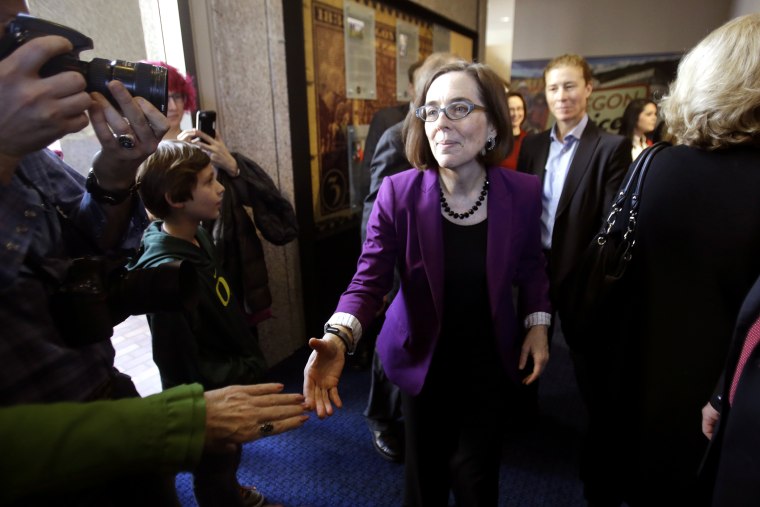One of the most discouraging facets of Republican governance in recent years is the aggressive new restrictions on voting rights, unlike anything Americans have seen since the Jim Crow era.
Between the Supreme Court's ruling on the Voting Rights Act and the coordinated GOP campaign,
half the nation's states "have adopted measures making it harder to vote" since 2011. Ari Berman
recently added that from 2011 to 2015, "395 new voting restrictions have been introduced" in 49 states.
But while the national tide is moving in a regressive direction when it comes to voting rights, some states are doing the opposite. David Ingram
reported yesterday on a breakthrough policy taking root in Oregon.
New legislation signed into law [on Monday] in Oregon paves the way for the state to one day have close to 100% voter registration. The new law takes the federal "motor voter" law to new levels and registers a person to vote when they obtain or renew a state driver's license or ID – and it's partially retroactive. The law dictates that once residents interact with the state DMV -- whether to get a license or ID for the first time, or renew an existing one -- they'll become registered to vote if they aren't already. The registration will be provisional for 21 days, during which time applicants will be notified of their new status and be given a chance to become affiliated with a political party or to opt-out of the voting process altogether.
That opt-out provision is key. In recent years, whenever ideas like these have come up, conservatives have argued that it's unconstitutional to force eligible Americans to register to vote if they don't want to. In effect, Americans have a right to forgo the benefits of citizenship if they want to.
Oregon is acknowledging this by giving the public a choice: eligible residents will be included in the system, but those who want to withdraw voluntarily are free to do so.
It's flipping the traditional model on its head. Currently, in all states, the burden is on the individual -- if you're eligible to vote, it's up to you to take the affirmative steps needed to register. There are groups committed to helping people do that, though in recent years GOP policymakers in states like Florida have made these voter-registration efforts more difficult, too.
But Oregon is poised to do the exact opposite, shifting the burden from the individual to the state.
Or as David Ingram's report put it, "In essence, Oregon will now be the first state to approach voting with an 'opt-out' mindset, as opposed to 'opt-in.'"
The law will reportedly be in place for the 2016 election cycle. It's also a big victory for Oregon's new governor, Democrat Kate Brown, who was
elevated to the governor's office unexpectedly last month after former Gov. John Kitzhaber's (D) resignation.
What's more, there's no reason Oregon's new policy can't serve as a national model. Alice Ollstein
noted that Vermont may very well follow suit.
One state ready to accept that challenge is Vermont, whose Secretary of State James Condos told ThinkProgress that an automatic registration system "just makes sense." "Voter participation among millennials is critical going forward, and we need to find ways to get them more involved," he said, noting that young men are still automatically registered for the draft unless they opt out. "If the Selective Service can do it, why can't we?" In a follow-up email, Condos said he's currently working with Vermont's DMV on upgrading their technology so that such a policy might be possible in the future, which he said would "benefit democracy in general as it will, most likely, increase voter turnout."
What will conservative states say to push back against the idea? I don't know, though I'll look forward to hearing the arguments.
